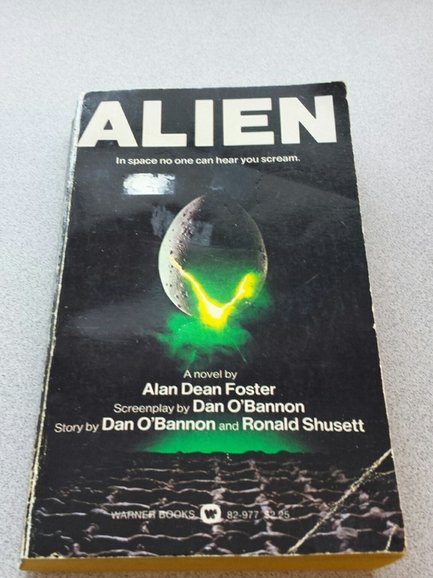I started thinking about some of my favorites, almost all of which are by Alan Dean Foster, the king of film novelizations (at least as far as I'm concerned).
One of the first of his I read was the novelization of one of my favorite films: ALIEN.
These are all things, however, that I imagine Foster used either from his own imaginings of written descriptions given to him, or perhaps from early concept artwork for the film - which of course went through many iterations before settling on the versions we saw on film. I'm glad that the final film versions did not have eyes, however, as frankly, it's far more chilling to see that shiny, blank skull "peering" at the camera and/or characters, than "giant, glowing yellow" eyes would be.
What surprised me was the tone of the novel - maybe it's the period in which it was written, or maybe Foster's own sensibilities, but the horror is decidedly absent, compared to the film. The tone, instead, is the sort of dry, by-the-books sci-fi you'd expect of 1950s/60s commercial science fiction prose. A lot of acronyms we're never given the meanings of, a lot of description of step-by-step actions taken by the crew as they perform specific tasks on the ship. Maybe it's meant to add realism, but while it works in a film, it really bogs down the narrative in prose, as it takes you out of the story and makes the reader feel like an uninformed observer who's suddenly become aware they don't belong on the Nostromo's bridge. The scene-changes, where the film frequently flicks back and forth between various crew-members, are badly handled, too, taking the reader out of the story - rather than line breaks (of which the novel has only one), the next paragraph will simply be focused on a different person in a different place. It was jarring.
In addition, the novel feels unbalanced in terms of the "acts" it's divided into. We're 110 pages into the book before Kane is back aboard the ship and placed in the autodoc and another sixty pages before the chest-burster (which has limbs, in this, as opposed to the worm-like appearance in the film) makes its appearance, by which point the book had begun to feel like it was dragging. The remainder of the plot plays out in less than a hundred additional pages, but contrary to feeling rushed, it actually feels lethargic - as if very little is happening and it's being padded out. That is, until we get to the final climactic scenes where the last of the crew--save Ripley--is killed and Ripley makes her escape - all of which, including Ripley's finally besting the xenomorph, is crammed into the last ten pages of the book. It's just badly-balanced plotting.
All of this sounds like a lot of complaining--and it is--but don't get the impression that I hated the novel, because I didn't. It wasn't as good as the film, but it was interesting to take a look at the story from a different perspective and in a different fashion. If I'd never seen the film before reading the novel, however, this book probably wouldn't have enticed me to watch it - so I'm glad it happened the other way around.


 RSS Feed
RSS Feed